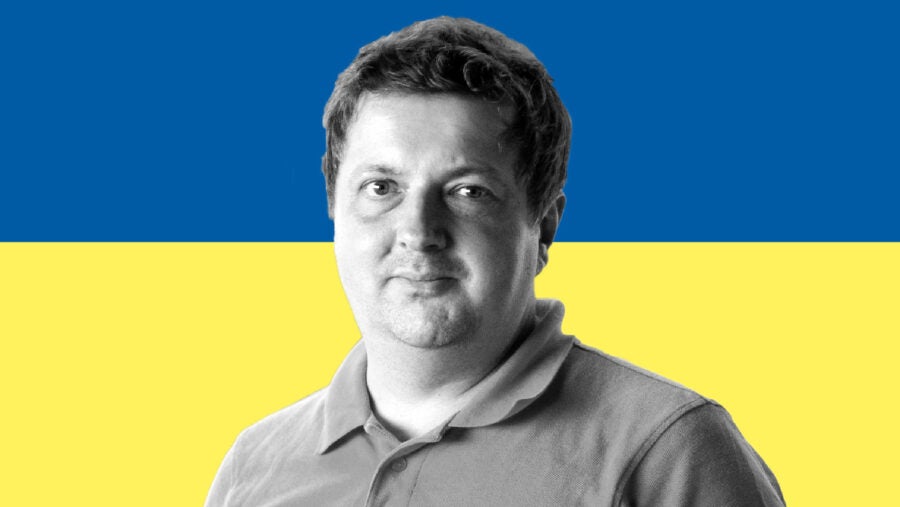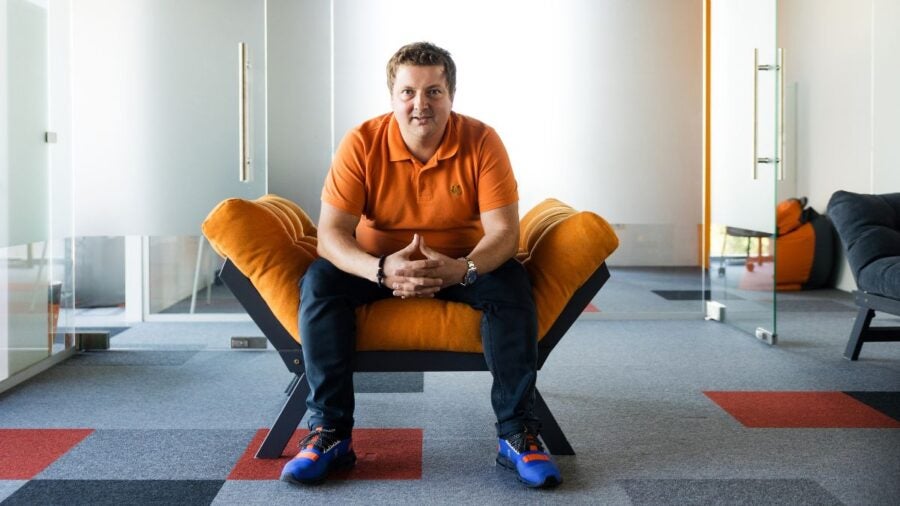
Even before Putin launched his “special military operation” in Ukraine on 24 February, there was a sense that Ukraine was under threat.
Andrew Pavliv, the founder and CEO of Ukrainian software outsourcing company N-iX, was aware that the situation in his home country was balanced on a knife edge. Statements from the US warned of a build up of the Russian military on the Ukrainian border and concerns about imminent war were mounting.
“We suspected something would happen even before the new year, last November in fact,” Pavliv recalls. “We were reading intelligence reports that left us thinking war could happen.”
Despite the signs N-iX, whose client list includes Lebara, Ovo Energy and Currencycloud, was looking forward to another successful year. The company has around 2,000 staff and revenues grew by 56% in 2021 during the post-Covid economic recovery.
If Covid hadn’t happened before then we would probably have had many more problems to contend with
Yet despite that positive outlook, Pavliv revisited the business’s continuity plans, which were set up after Russia annexed Crimea in 2014. These predicted, from experience, that Russia would start to engage from the east and Crimea. This meant that 200 of N-iX’s staff, who were based in the cities of Dnipro, Kharkiv, Mykolaiv and Kherson, were particularly vulnerable if Russia attacked.
“We recommended people leave those areas with their families because we thought that something was about to happen,” he says. “We were also analysing what other companies were doing and saw they were issuing similar warnings.”
On 21 February, when Putin announced his recognition of separatist claims over the independence of Donetsk and Luhansk, war was inevitable. “The only question was – when,” Pavliv explains.
The statements triggered an emergency call between N-iX’s management in which it was decided the company should issue a “much stronger warning” to staff. The HR department called everybody personally to ask about their plans to stay safe.
Despite the stern warning, only a few people heeded the advice to relocate or took up the company’s offers to help them find alternative accommodation. “One of the things we now realise is that people seem to be reluctant to take action until something bad actually happens,” Pavliv says.
Running a business during war
On the eve of the war, Pavliv and his business partner ruminated about the company’s future over beers in his apartment. Depending on how things worked out, Pavliv wondered whether N-iX would have to be renamed PhoeN-ix and, like that mythical bird, be reborn.
When the first bombs fell on Ukraine, the full business continuity plan was put into action. The recruitment team was tasked with calling everyone at the company each day to ensure they were safe and helped those who remained in the east of the country to move. The company’s Lviv head office was kept open 24 hours a day and acted as an “internal refugee centre” for employees, providing those that were relocating with a place to stay for the night with their families.
As a company with a relatively young workforce, mostly aged between 25 and 35 years old, they had prepared for up to 500 people to stay in the Lviv office, taking into account that some people would also have their families with them. But Pavliv admits he was not prepared for the number of pets people brought with them.
Office policy was that animals were not allowed in the workplace but restrictions have since been lifted to allow pets. “It was the first time since Covid that we had such crowded offices,” Pavliv says.

Beyond the safety of his staff, Pavliv’s next major concern was the business. A message was sent to clients on Thursday 24 February. “We let them know that war had started, that there could be an interruption to some of our services but that we hoped to continue to deliver,” Pavliv says. “I told management at the time that I didn’t believe any of our clients would drop us, as long as we kept providing a service.”
Most of N-iX’s clients were supportive and 80% of them paid their invoices in advance to help the business with cashflow, while others asked where they could donate to support the Ukrainian cause. By the end of the first week in March, the business’s output had already returned to its usual rate. N-iX signed new clients in February and a further 16 in March – mere weeks after the start of the Russian invasion. Pavliv adds: “The word got out that we were continuing to deliver, so people were encouraged to work with us.”
He says the experience of having to quickly adjust during the coronavirus pandemic helped in this regard. “We were already almost fully remote, which made things easier,” Pavliv says. “If Covid hadn’t happened before then we would probably have had many more problems to contend with.”
Although Lviv managed to avoid much of the heavy shelling at the start of the conflict, it didn’t avoid attacks completely. Several explosions hit the city in March and in April long-range rockets that were targeting railway infrastructure whizzed past Pavliv’s apartment block.
I feel good dealing with challenges that are much bigger than those just facing the company and where you need to act quickly
When it became apparent that Lviv was not the haven many expected, N-iX took chairs, coffee machines, water and internet into the office’s underground parking lot. When the anti-aircraft sirens sounded – which would happen on average every second day during the worst periods – people could continue their work while hunkered down.
“We got used to the sirens and the working situation quite quickly,” Pavliv says. “Over the summer it was the same situation, and it almost returned to business as unusual. The only difference was that men still weren’t allowed to leave the country.”
After president Zelensky declared martial law at the start of the Russian invasion, all Ukrainian men aged 18 to 60 who were eligible for military service were forbidden from leaving the country. Pavliv says that around 35 people from N-iX have fought on the battlefield. “Unfortunately we have one person, who worked as a quality assurance lead, who died in Kharkiv,” Pavliv says. “This is sad news. But fortunately, it’s only been one person that we’ve lost from the company. He is a hero.”
Business disrupted once more
The situation changed again in October when Russia began targeting Ukrainian infrastructure. Nearly a third of Ukraine’s power stations were destroyed in drone attacks at the start of the month, forcing the government to issue planned blackouts for the worst-affected regions.
“This interrupted business delivery for some time,” Pavliv says. “Clients were worried about it because international news was reporting that Ukraine had only 40% of its usual electricity capacity.”
The business quickly adapted to working around the planned blackouts, even renting a new office in Kyiv that had connections to three different power stations to minimise the chance of disruption.
Looking back on the past year of turbulence, Pavliv believes his leadership style suits unpredictable situations. “You get to the reality of your business on a very deep level,” he says. “You need to be able to mobilise everybody in the company quickly. Even when Covid started, I considered myself a wartime CEO.”
Some adaptation was necessary. His focus as CEO switched from day-to-day operations to the wider business strategy and Pavliv knows he has had to develop resilience. “I noticed myself becoming more relaxed in other situations when we weren’t facing a crisis,” Pavliv adds. “I feel good dealing with challenges that are much bigger than those just facing the company and where you need to act quickly.”
Despite the external challenges, N-iX did not stop recruiting in Ukraine at any point over the past 12 months and revenue has grown by 35%. “We were already a global company but war pushed us to expand into other countries to improve our resilience,” Pavliv says. There are plans to open an office in Columbia before the end of the year.
More than $2.5m (£1.6m) has been raised by the company and its staff to help Ukrainian charities and buy vehicles and ambulances to donate to the front line. “We can help Ukraine even more by continuing to expand,” Pavliv says. “We were founded in Ukraine by Ukrainian people. Even though we will soon have the same number of employees outside the country as in, we will always keep our bulletproof resilience.”

Even before Putin launched his “special military operation” in Ukraine on 24 February, there was a sense that Ukraine was under threat.
Andrew Pavliv, the founder and CEO of Ukrainian software outsourcing company N-iX, was aware that the situation in his home country was balanced on a knife edge. Statements from the US warned of a build up of the Russian military on the Ukrainian border and concerns about imminent war were mounting.
“We suspected something would happen even before the new year, last November in fact,” Pavliv recalls. “We were reading intelligence reports that left us thinking war could happen.”
